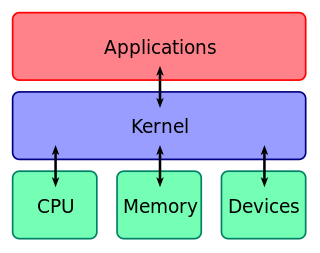
Andrew Stuart Tanenbaum, sometimes referred to by the handle ast, is an American–Dutch computer scientist and professor emeritus of computer science at the Vrije Universiteit Amsterdam in the Netherlands.

A computer program is a sequence or set of instructions in a programming language for a computer to execute. It is one component of software, which also includes documentation and other intangible components.

In computing, a device driver is a computer program that operates or controls a particular type of device that is attached to a computer or automaton. A driver provides a software interface to hardware devices, enabling operating systems and other computer programs to access hardware functions without needing to know precise details about the hardware being used.

MINIX is a Unix-like operating system based on a microkernel architecture. Since version 2.0, it has been POSIX compliant.

In computer science, a microkernel is the near-minimum amount of software that can provide the mechanisms needed to implement an operating system (OS). These mechanisms include low-level address space management, thread management, and inter-process communication (IPC).

An operating system (OS) is system software that manages computer hardware and software resources, and provides common services for computer programs.

vi is a screen-oriented text editor originally created for the Unix operating system. The portable subset of the behavior of vi and programs based on it, and the ex editor language supported within these programs, is described by the Single Unix Specification and POSIX.

A Commentary on the Sixth Edition UNIX Operating System by John Lions is a highly influential 1976 publication containing analytical commentary on the source code of the 6th Edition Unix computer operating system "resident nucleus" software, plus copy formatted and indexed by Lions, of said source code obtained from the authors at AT&T Bell Labs. It is also commonly referred to as the Lions Book.
ext2, or second extended file system, is a file system for the Linux kernel. It was initially designed by French software developer Rémy Card as a replacement for the extended file system (ext). Having been designed according to the same principles as the Berkeley Fast File System from BSD, it was the first commercial-grade filesystem for Linux.
Amoeba is a distributed operating system developed by Andrew S. Tanenbaum and others at the Vrije Universiteit Amsterdam. The aim of the Amoeba project was to build a timesharing system that makes an entire network of computers appear to the user as a single machine. Development at the Vrije Universiteit was stopped: the source code of the latest version (5.3) was last modified on 30 July 1996.

The Alexis de Tocqueville Institution (AdTI) was a Washington, D.C. based think tank.
Samizdat: And Other Issues Regarding the 'Source' of Open Source Code is a 2004 report by Kenneth Brown. The report suggests that the Linux kernel may have been created or distributed illegally and that open-source software may be generally subject to such abuses.
The Minix file system is the native file system of the Minix operating system. It was written from scratch by Andrew S. Tanenbaum in the 1980s and aimed to replicate the structure of the Unix File System while omitting complex features, and was intended to be a teaching aid. It largely fell out of favour among Linux users by 1994 due to the popularity of other filesystems - most notably ext2 - and its lack of features, including limited partition sizes and filename length limits.

The Tanenbaum–Torvalds debate was a written debate between Andrew S. Tanenbaum and Linus Torvalds, regarding the Linux kernel and kernel architecture in general. Tanenbaum, the creator of Minix, began the debate in 1992 on the Usenet discussion group comp.os.minix, arguing that microkernels are superior to monolithic kernels and therefore Linux was, even in 1992, obsolete. The debate has sometimes been considered a flame war.

Minix 3 is a small, Unix-like operating system. It is published under a BSD-3-Clause license and is a successor project to the earlier versions, Minix 1 and 2.
The Amsterdam Compiler Kit (ACK) is a retargetable compiler suite and toolchain written by Andrew Tanenbaum and Ceriel Jacobs, since 2005 maintained by David Given. It has frontends for the following programming languages: C, Pascal, Modula-2, Occam, and BASIC.

Linux is a family of open-source Unix-like operating systems based on the Linux kernel, an operating system kernel first released on September 17, 1991, by Linus Torvalds. Linux is typically packaged as a Linux distribution (distro), which includes the kernel and supporting system software and libraries, many of which are provided by the GNU Project. Many Linux distributions use the word "Linux" in their name, but the Free Software Foundation uses and recommends the name "GNU/Linux" to emphasize the use and importance of GNU software in many distributions, causing some controversy.
Linux began in 1991 as a personal project by Finnish student Linus Torvalds to create a new free operating system kernel. The resulting Linux kernel has been marked by constant growth throughout its history. Since the initial release of its source code in 1991, it has grown from a small number of C files under a license prohibiting commercial distribution to the 4.15 version in 2018 with more than 23.3 million lines of source code, not counting comments, under the GNU General Public License v2 with a syscall exception meaning anything that uses the kernel via system calls are not subject to the GNU GPL.

The kernel is a computer program at the core of a computer's operating system and generally has complete control over everything in the system. The kernel is also responsible for preventing and mitigating conflicts between different processes. It is the portion of the operating system code that is always resident in memory and facilitates interactions between hardware and software components. A full kernel controls all hardware resources via device drivers, arbitrates conflicts between processes concerning such resources, and optimizes the utilization of common resources e.g. CPU & cache usage, file systems, and network sockets. On most systems, the kernel is one of the first programs loaded on startup. It handles the rest of startup as well as memory, peripherals, and input/output (I/O) requests from software, translating them into data-processing instructions for the central processing unit.
Tinix, is a tutorial operating system (OS) written by Yu Yuan. It is used to teach fundamentals rather than to do work. In his book "Writing OS DIY", Yu provides all source code for Tinix. Tinix borrows many concepts and methods from Minix. The book compensates for practical computer programming skills, especially in x86 assembly language, lacking in Andrew S. Tanenbaum's book "Operating Systems: Design and Implementation", 1987, 1997, 2006.











